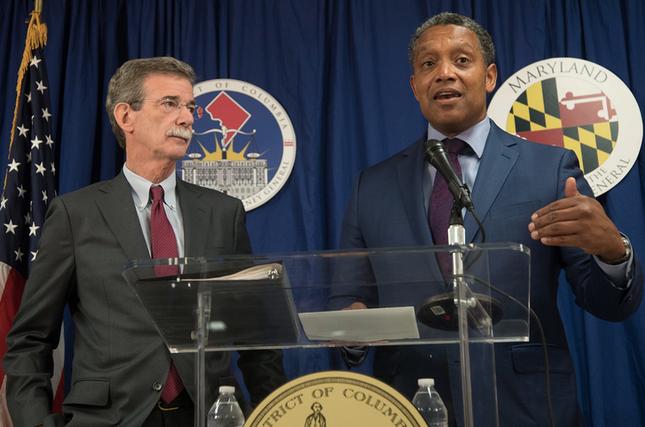Attorneys General Sue President Trump
By • June 12, 2017 0 277

This morning, June 12, the attorneys general of Washington, D.C., and Maryland announced that they filed what they call a “major lawsuit” against President Donald Trump. In their complaint, Karl A. Racine, D.C.’s AG, and Brian E. Frosh, Maryland’s AG, allege that the President’s wide-ranging business entanglements — in particular his continued ownership of the Trump International Hotel just a few blocks from the White House — violate the Constitution’s foreign and domestic emoluments clauses.
The foreign emoluments clause prohibits the president and other government employees from accepting foreign gifts and payments without congressional approval. The attorneys general claim that the president violated the Constitution by accepting payments from foreign governments when they do business at a Trump-owned establishment such as the hotel. The suit seeks an injunction to put a stop to these alleged violations.
It is not clear what it would mean to put a stop to them. Have the hotel closed until the president divests his ownership? Forbid foreign dignitaries and lobbyists from booking rooms or having meals there?
The emoluments clauses were included in the Constitution to shield and prevent the president from benefiting from outside influence and ensure that he works in the nation’s interest rather than in his personal financial interest. “Specifically, the Foreign Emoluments Clause bars foreign powers from influencing or inducing the President with money or other items of value. The Domestic Emoluments Clause prevents individual states from competing against each other by giving the President money or other things of value,” according to the Washington Post.
“We are a nation of laws and no one — including the President of the United States — is above the law,” said Attorney General Racine. “As state attorneys general representing the people, we have a duty to serve as a check and balance against the president, whose business activities have opened the door to the type of corruption the Framers of our Constitution aimed to prevent.”
If a federal judge allows the case to proceed, Racine and Frosh say they will demand copies of Trump’s personal tax returns in court to gauge the extent of his foreign business dealings.
“We have economic interests that are impacted,” they said. “But the most salient factor is that when the president is subject to foreign influence, we have to be concerned about whether the actions he’s taking — both at home and abroad — are the result of payments that he is receiving at the Trump Hotel and other businesses,” Frosh said.
This is not the first time the president has been sued under the emoluments clauses. Just days after his inauguration in January, the government watchdog Citizens for Responsibility and Ethics in Washington filed a federal lawsuit in the Southern District of New York. Since then, a restaurant group and two individuals in the hotel industry have joined as plaintiffs.
The president called the earlier, similar lawsuit about the emoluments issue “without merit, totally without merit.”
The Justice Department said Friday that those plaintiffs did not suffer in any way and had no standing to sue, and that it is unconstitutional to sue the president in his official capacity.
Legal scholars who have addressed the emoluments clauses as they pertain to President Trump have mixed opinions. According to Richard Painter, an ethics lawyer in the George W. Bush White House, the president must sell his assets — particularly those with foreign ties — in an initial public offering. If Trump doesn’t, the overseas properties could amount to a national security threat.
Harvard University Law School’s Laurence Tribe wrote in an email that “The only way the president could avoid violating [the emoluments clause] would be to get congressional consent or divest his assets and place the proceeds in a blind trust.”
But Stanford’s Michael McConnell disagreed that the clause applies, saying Trump’s ownership stake in the Trump Organization, which does business overseas, is not the same as Trump dealing with another country personally. “I don’t think we have ever believed that officers of the U.S. can’t own stock in a company that does business abroad,” McConnell said.
University of California Los Angeles School of Law professor Adam Winkler has a different take. “The behavior of past presidents suggests Trump is deviating from the norm. Most presidents have avoided having any kinds of financial arrangements with foreign countries,” he said, “and presidents in the past have been very rigorous in reporting gifts from foreign governments.” Winkler was featured last week at the American Constitution Society’s annual meeting.

